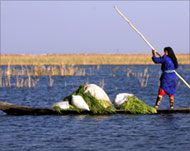Iraq’s drained marshes half restored
Iraq’s ancient marshlands drained by Saddam Hussein are nearly half-restored, giving hope of saving traditional habitats for both people and animals.

A Japanese-funded UN project launched a year ago has used the internet and eco-friendly technology to restore the Middle East’s main wetland area, which is believed to be the basis for the biblical Garden of Eden.
Shia fighters hid in the labyrinth of waterways and floating reeds after Saddam’s Sunni-dominated regime crushed a Shia insurrection after the 1991 Gulf War.
In retaliation, Saddam diverted waterways and burned down the reedbeds, reducing the 9000 square km of permanent wetlands in the 1970s to just 760 square km when his government was toppled in 2003.
Ecological disaster
The UN Environment Programme (UNEP) said its satellite images showed that 37% of the permanent wetlands was now restored, with the figure nearing 50% in the spring before water evaporated with the summer heat.
 |
|
Marsh Arabs had been robbed of |
“The near-total destruction of the Iraqi marshlands under the regime of Saddam Hussein was a major ecological and human disaster, robbing the Marsh Arabs of a centuries-old culture and way of life as well as food in the form of fish and that most crucial of natural resources, drinking water,” UNEP executive director Klaus Toepfer said in a statement on Wednesday.
“The evidence of their rapid revival is a positive signal, not only for the environment and the local communities who live there, but must be seen as a contribution to wider peace and security for the Iraqi people and the region as a whole,” he said in a statement.
But he added: “While the reflooding bodes well for the Iraqi marshes, their recovery will take many years.”
Ali Khaiun, a member of the Iraqi parliament, said while the programme was laudable, Marsh Arabs still needed improvements in infrastructure such as roads, electricity and drinking water.
“There has been no tangible change in the marshland,” Khaiun told a news conference in Tokyo, appealing for more international aid.
Forced urbanisation
Saddam’s draining of the wetlands forced the bulk of the Marsh inhabitants to give up their traditional farming and fishing, and to head to cities to work as labourers.
 |
|
Many Marsh Arabs were forced to |
The draining of the wetlands also deprived migratory birds and fish, some of them unique to the area, of a key habitat.
Local residents opened floodgates and embankments when Saddam was toppled in the 2003 invasion.
Toepfer said he hoped the project could be a model for other environmentally ravaged areas.
“I hope the lessons learnt to date in restoring this vital ecosystem and its economically important natural services can help in the restoration of other damaged and degraded ecosystems elsewhere,” he said.
Monique Barbut, a senior official of the UNEP’s technology, industry and economics division, said that the $11 million provided by Japan will be completed by October.
Training for Iraqis
The UNEP is talking to other UN bodies and Italy may take over the programme, she told the news conference.
|
“The evidence of their rapid revival is a positive signal, not only for the environment and the local communities who live there, but must be seen as a contribution to wider peace and security for the Iraqi people and the region as a whole” Klaus Toepfer, |
Koichi Ito, a Japanese Foreign Ministry official, told AFP that Tokyo is “examining the possibility of providing additional aid” to continue the marshland environmental project.
The project will help restore the marshes and provide clean drinking water and sanitation for 100,000 people living there.
The programme is also providing settlements with water-treatment systems and restoring reed beds that act as natural water filters.
It is also training 250 Iraqis in wetland management and restoration.
At one time, the wetlands were the largest in the Middle East, filtering polluted water from northern cities and purifying it before it reached the southern rivers and the city of Basra.